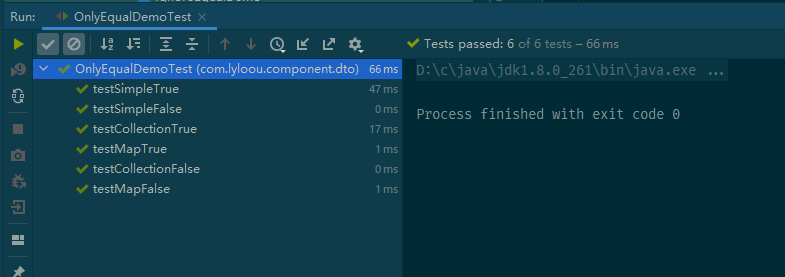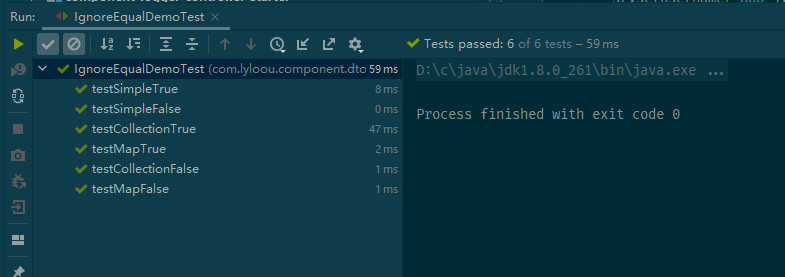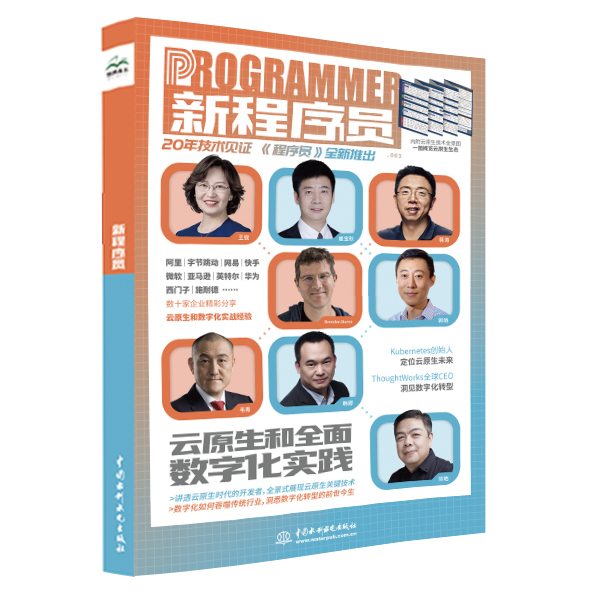背景
编写代码时,会经常需要编写两个对象是否相等的逻辑,一般会有如下做法
- 直接写在业务代码中;
- 单独写个方法,业务代码中调用;
- 重写 equals 方法;
上面这些做法,都比较复杂,如果属性太多或复杂点(如果是 list 和 map 就更复杂了),就需要编写更多的判断逻辑代码了。
想法
如果能只需要提供比较的方法引用列表,有个地方能自动方法引用取值,并比较就好了。
思路 1
- 在 java8 中可以使用方法引用,如:People::getName;
- 可以将所有要比较的 Getter 保存到列表中;
- 在 比较的时候,根据 方法引用获取具体的值进行比较;
- 全部比较都相等了,就认为是相等的。
思路 2
- 思路 1 适用于需要比较的字段少时,有一种情况是,需要比较的字段多,只想排除掉少量字段
- 通过注解来忽略指定的字段
- 获取全部字段,过滤掉忽略的字段,通过反射比较字段对应的值。
举个例子 1(改造前)
@Getter
@Setter
public class EqualDemo implements Equable {
private Integer id;
private Integer age;
private String username;
private Date createTime;
private Date updateTime;
private List<EqualDemo> list;
private Map<String, EqualDemo> map;
@Override
public boolean equals(Object obj) {
if (obj instanceof EqualDemo) {
if (!Objects.equals(((EqualDemo) obj).getId(), this.getId())) {
return false;
}
if (!Objects.equals(((EqualDemo) obj).getAge(), this.getAge())) {
return false;
}
if (!Objects.equals(((EqualDemo) obj).getUsername(), this.getUsername())) {
return false;
}
final List<EqualDemo> list1 = ((EqualDemo) obj).getList();
final List<EqualDemo> list2 = this.getList();
// todo 比较 list1 和 list2
final Map<String, EqualDemo> map1 = ((EqualDemo) obj).getMap();
final Map<String, EqualDemo> map2 = this.getMap();
// todo 比较 map1 和 map2
return true;
}
return Objects.equals(this, obj);
}
}
// 使用
public class EqualDemoTest {
@Test
public void testSimpleTrue() {
final EqualDemo s1 = new EqualDemo();
s1.setId(1);
s1.setUsername("bob");
final EqualDemo s2 = new EqualDemo();
s2.setId(1);
s2.setUsername("bob");
// // s1 和 s2 相等
assert s1.equals(s2);
}
}
举个例子 2(改造后-指定需要比较的字段的 Getter 方法引用)
@Getter
@Setter
public class OnlyEqualDemo implements Equable {
private Integer id;
private Integer age;
private String username;
private Date createTime;
private Date updateTime;
private List<OnlyEqualDemo> list;
private Map<String, OnlyEqualDemo> map;
@SuppressWarnings("unchecked")
@Override
public List<EqualGetter<OnlyEqualDemo>> listOnlyEqualsToGetter() {
final EqualGetter<OnlyEqualDemo> getId = OnlyEqualDemo::getId;
return Arrays.asList(
getId,
OnlyEqualDemo::getAge,
OnlyEqualDemo::getUsername,
OnlyEqualDemo::getList,
OnlyEqualDemo::getMap
);
}
}
// 使用
public class OnlyEqualDemoTest {
@Test
public void testSimpleTrue() {
final OnlyEqualDemo s1 = new OnlyEqualDemo();
s1.setId(1);
s1.setUsername("bob");
final OnlyEqualDemo s2 = new OnlyEqualDemo();
s2.setId(1);
s2.setUsername("bob");
// // s1 和 s2 相等
assert s1.onlyEqualsTo(s2);
}
}
举个例子 3(改造后-排除少量字段)
@Getter
@Setter
public class IgnoreEqualDemo implements Equable {
private Integer id;
@EqualIgnored
private Integer age;
private String username;
@EqualIgnored
private Date createTime;
@EqualIgnored
private Date updateTime;
private List<IgnoreEqualDemo> list;
private Map<String, IgnoreEqualDemo> map;
}
// 使用
public class IgnoreEqualDemoTest {
@Test
public void testSimpleTrue() {
final IgnoreEqualDemo s1 = new IgnoreEqualDemo();
s1.setId(1);
s1.setUsername("bob");
s1.setCreateTime(new Date());
final IgnoreEqualDemo s2 = new IgnoreEqualDemo();
s2.setId(1);
s2.setUsername("bob");
// // s1 和 s2 相等
assert s1.ignoreEqualsTo(s2);
}
}
这样就简洁很多了,由于 ignoreEqualsTo 和 onlyEqualsTo 方法是 Equable 接口中的默认方法,具体逻辑全封装起来了(包括 object, collection 和 map 的处理),不需要重写就可以直接使用,具体实现看下面的源码。
源码
import lombok.SneakyThrows;
import java.beans.PropertyDescriptor;
import java.io.Serializable;
import java.lang.reflect.Field;
import java.lang.reflect.Method;
import java.util.*;
import java.util.function.BiFunction;
import java.util.stream.Collectors;
/**
* 比较两个对象是否相等
*
* @author lilou
* @date 2022/4/9 9:30
* <p>
* @see Equable#onlyEqualsTo(Equable) 方法1:通过 Getter方法引用 来指定需要比较的字段(场景:字段总量多,但是只需要比较少量字段时)
* @see Equable#ignoreEqualsTo(Equable) 方法2:通过忽略注解({@code EqualIgnored})来指定忽略比较的字段,未标识的字段会全部参与比较(场景:字段总量多,但是只需要排除少量字段时)
* 注意:onlyEqualsTo 和 ignoreEqualsTo 不要混用
*/
public interface Equable extends Serializable {
long serialVersionUID = 1L;
/**
* 使用方法引用来比较,只比较指定的 Getter 方法引用。
* 使用此方法:重写 listOnlyEqualsToGetter 方法,指定需要比较的字段的Getter方法引用
*
* @param other 另一个 model
* @return 结果
*/
default boolean onlyEqualsTo(Equable other) {
final List<EqualGetter<Equable>> getterList = listOnlyEqualsToGetter();
// getter方法引用列表中没有需要比较的 getter,直接比较对象
if (getterList == null || getterList.isEmpty()) {
return Objects.equals(other, this);
}
// 列表有值,计算两个对象在列表中 getter 值,并比较是否相等
for (EqualGetter<Equable> equalGetter : getterList) {
Object o1 = equalGetter.apply(this);
Object o2 = equalGetter.apply(other);
// 对于属性中也有实现了 Equable 接口的,递归调用
if (o1 instanceof Equable && o2 instanceof Equable) return ((Equable) o1).onlyEqualsTo((Equable) o2);
// equalTo collection
if (o1 instanceof Collection && o2 instanceof Collection) {
// 判断不相等
if (notEqualsCollection((Collection<?>) o1, (Collection<?>) o2, Equable::onlyEqualsTo)) return false;
// 列表已经判断完了,开始下一个属性
continue;
}
// equalTo map
if (o1 instanceof Map && o2 instanceof Map) {
if (notEqualsMap((Map<?, ?>) o1, (Map<?, ?>) o2, Equable::onlyEqualsTo)) return false;
// 列表已经判断完了,开始下一个属性
continue;
}
if (!Objects.equals(o1, o2)) {
return false;
}
}
return true;
}
default boolean notEqualsMap(Map<?, ?> o1, Map<?, ?> o2, BiFunction<Equable, Equable, Boolean> biFunc) {
// 比较 key
final Collection<?> set1 = o1.keySet();
final Collection<?> set2 = o2.keySet();
if (notEqualsCollection(set1, set2, biFunc)) return true;
// 比较 value
final Collection<?> values1 = o1.values();
final Collection<?> values2 = o2.values();
return notEqualsCollection(values1, values2, biFunc);
}
/**
* 判断 collection 是否不相等
*
* @param o1 第一个 collection
* @param o2 第二个 collection
* @return 是否不相等
*/
default boolean notEqualsCollection(Collection<?> o1, Collection<?> o2, BiFunction<Equable, Equable, Boolean> biFunc) {
if (Objects.isNull(o1) && Objects.isNull(o2)) {
return false;
}
if (Objects.isNull(o1) || Objects.isNull(o2)) {
return true;
}
if (o1.isEmpty() && o2.isEmpty()) {
return false;
}
if (o1.size() != o2.size()) {
return true;
}
// 根据 hashCode 来排序
o1 = o1.stream().sorted(Comparator.comparingInt(Object::hashCode)).collect(Collectors.toList());
o2 = o2.stream().sorted(Comparator.comparingInt(Object::hashCode)).collect(Collectors.toList());
// 逐个比较
final Iterator<?> iterator1 = o1.iterator();
final Iterator<?> iterator2 = o2.iterator();
while (iterator1.hasNext() && iterator2.hasNext()) {
final Object next1 = iterator1.next();
final Object next2 = iterator2.next();
if (next1 instanceof Equable && next2 instanceof Equable) {
if (!biFunc.apply((Equable) next1, (Equable) next2)) {
return true;
}
} else {
return !Objects.equals(next1, next2);
}
}
return false;
}
/**
* 需重写
* <p>
* 需要比较的 Getter 方法列表(原理是通过Getter 的 apply 方法得到实际的值,再进行比较)
*
* @param <T> 泛型
* @return getter 方法列表
*/
default <T extends Equable> List<EqualGetter<T>> listOnlyEqualsToGetter() {
return Collections.emptyList();
}
/**
* getter方法接口定义
*/
@FunctionalInterface
interface EqualGetter<T extends Equable> extends Serializable {
Object apply(T source);
}
/**
* IgnoreEqual 注解+反射来实现 equal 逻辑
*
* @param other 另一个 model
* @return 结果
*/
@SneakyThrows
default boolean ignoreEqualsTo(Equable other) {
if (Objects.equals(this, other)) {
return true;
}
final Class<? extends Equable> aClass1 = this.getClass();
final Class<? extends Equable> aClass2 = other.getClass();
if (!Objects.equals(aClass1, aClass2)) {
return false;
}
final Field[] declaredFields = aClass1.getDeclaredFields();
for (Field declaredField : declaredFields) {
// 字段是否被标记忽略
final EqualIgnored isIgnored = declaredField.getAnnotation(EqualIgnored.class);
if (Objects.nonNull(isIgnored)) {
continue;
}
final PropertyDescriptor propertyDescriptor = new PropertyDescriptor(declaredField.getName(), aClass1);
final Method readMethod = propertyDescriptor.getReadMethod();
final Object o1 = readMethod.invoke(this);
final Object o2 = readMethod.invoke(other);
// 对于属性中也有实现了 Equable 接口的,递归调用
if (o1 instanceof Equable && o2 instanceof Equable) return ((Equable) o1).ignoreEqualsTo((Equable) o2);
// equalTo collection
if (o1 instanceof Collection && o2 instanceof Collection) {
// 判断不相等
if (notEqualsCollection((Collection<?>) o1, (Collection<?>) o2, Equable::ignoreEqualsTo)) return false;
// 列表已经判断完了,开始下一个属性
continue;
}
// equalTo map
if (o1 instanceof Map && o2 instanceof Map) {
if (notEqualsMap((Map<?, ?>) o1, (Map<?, ?>) o2, Equable::ignoreEqualsTo)) return false;
// 列表已经判断完了,开始下一个属性
continue;
}
if (!Objects.equals(o1, o2)) {
return false;
}
}
return true;
}
}
@Target({ElementType.FIELD})
@Retention(RetentionPolicy.RUNTIME)
@Documented
public @interface EqualIgnored {
}
单元测试
方法 1:
https://github.com/lyloou/component/blob/master/component-dto/src/test/java/com/lyloou/component/dto/OnlyEqualDemoTest.java

方法 2:
https://github.com/lyloou/component/blob/master/component-dto/src/test/java/com/lyloou/component/dto/IgnoreEqualDemoTest.java

参考资源
- https://github.com/lyloou/component/blob/master/component-dto/src/main/java/com/lyloou/component/dto/Equable.java
- https://github.com/lyloou/component/blob/master/component-dto/src/main/java/com/lyloou/component/dto/field/FieldUtil.java
